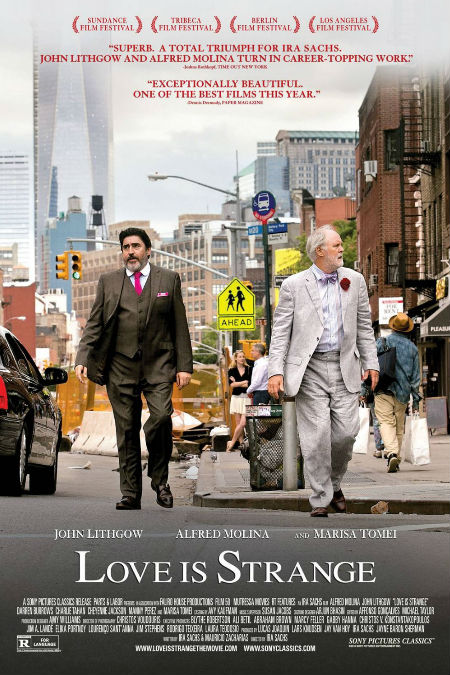
While grandly romantic gestures like impossibly large bunches of flowers for no reason, a surprise marriage proposal at a beloved’s favourite bookstore and heart-stirring declarations of commitment on major anniversaries are usually what gets love all its fantastically positive PR, it’s what happens in the little moments, in the nitty-gritty of every day life between two people that really gets remembered and will matter over time.
This is nowhere more evident than in Ira Sach’s sublimely poignant ode to the simple but enduring gestures of love, Love is Strange, which quietly recognises that when the flowers have died, and the eloquent speeches have passed out of memory, it’s the fact that two people have each other, know each other and can depend on each other that will get them through the oatmeal days that invariably following the champagne nights.
And anxious, artistic Ben (John Lithgow) and upbeat, musical George (Alfred Molina) two men of a certain age that have been devotedly together for 39 years before recently tying the knot, suddenly find themselves having far more oatmeal days than either of them bargained for when the Catholic school George works for twelve years decides that having a married gay man on their staff doesn’t square with their Christian ethos (this is despite knowing about his sexuality the whole time he worked there).
Suddenly relient on the small income George receives from his private piano students and Ben’s meagre pension, the newly married couple find themselves at a highly unpalatable crossroads in the lives, forced to sell their much-loved apartment as they throw themselves, not so much on the kindness of strangers as their “family” of actual relatives and close friends.
It causes just as much dislocation and angst as you would expect it would with Ben’s half-hearted assurances, more to himself than anyone else, that it’s all very temporary failing to translate into a hoped-for, short-lived reality.
A “week or two” suddenly becomes weeks and months creating all kinds of pressures on previously bonhomie-filled relationships.
Ben, the more emotionally-delicate of the two, struggles to adapt to his new circumstances which including sharing a bunk bed in a very small bedroom with the moody teenage son Joey (Charlie Tahan) of his adored nephew Elliot (Darren Burrows) and wife Kate (Marisa Tomei) and having to paint on a windy rooftop which bears no resemblance to the cosy eerie he called his creative home back in the much-missed apartment.
Similarly George, though the more robust of the two in almost every respect, finds sharing the often noisy, party-filled apartment of close friends, New York policemen couple Ted (Cheyenne Jackson) and Roberto (Manny Perez) more intrusive and exhausting than he expected, leading to one of the most tender and heartbreaking scenes of the film when he walks through pouring rain simply so he can be held, inconsolable initially, by Ben.
It’s heartbreakingly all too real watching the two men, who Kate holds up as the gold standard of love and commitment, struggling to adapt to living apart and not being being able to fall asleep and wake up together like they have for nearly four decades.
The realness of the situation is brought home in small, subtle but touching ways by Ira Sachs’ and Mauricio Zacharias’ delicately-modulated script which relies less on big showy declarations of love and devotion and more on the small intimate things such as shared knowing look or a simply hand-holding in a crowded symphony hall that are the hallmark of close, devoted, stable relationships.
You see Ben and George in small but telling moments, struggling to keep up the brave face that both feel the need to employ as they battle to find an apartment they can afford on their much-reduced income, an apartment which will allow them to be together again and resume the comforting routine of a relationship that means the world to both of them and without which it’s doubtful they will last long.
The most affecting part of Love is Strange, is this observance of the small but critically-important moments that together make up the life of two people who fall out of rhythm with life in general when they’re not together.
A simple line of dialogue here, such as when remarks that George went to church while he went to a movie, and a moving gesture there, such as Ben’s insistence that he and George share the bottom bunk bed even if it means they will sleep literally cheeky-by-jowl, are all that’s needed to convey a relationship that though long in the tooth, is not short of softly, meaningfully expressed passion.
The music of Chopin and the exquisitely-lit cinematography of Christos Voudouris augment this sense of lingering closeness and intimacy, as we explore how love is expressed not simply in the lives of Ben and George but also in those of the people who take them in their unexpectedly darkest hour and who in their own ways, find their fealty to each tested in ways none of them expected.
While Love is Strange does suffer from a partially indeterminate ending and an occasionally faltering narrative, it is overall an emotionally-evocative, richly warm and meaningful dissertation on the way in which love ultimately exists in the small, imperfect and quickly-snatched moments of real life, both the good but most especially the bad, with more far more vigour, meaning and purpose than it is otherwise often credited.